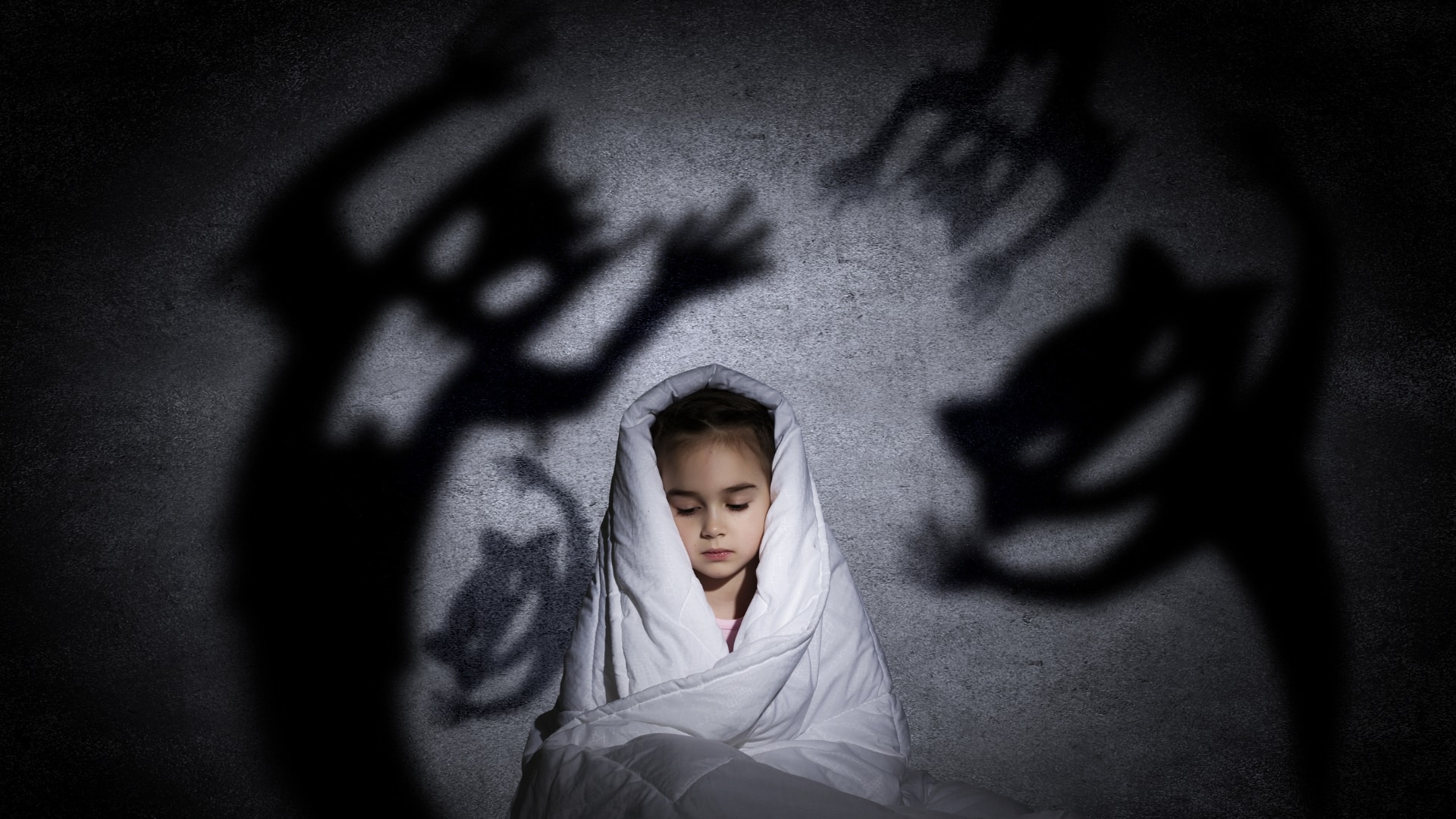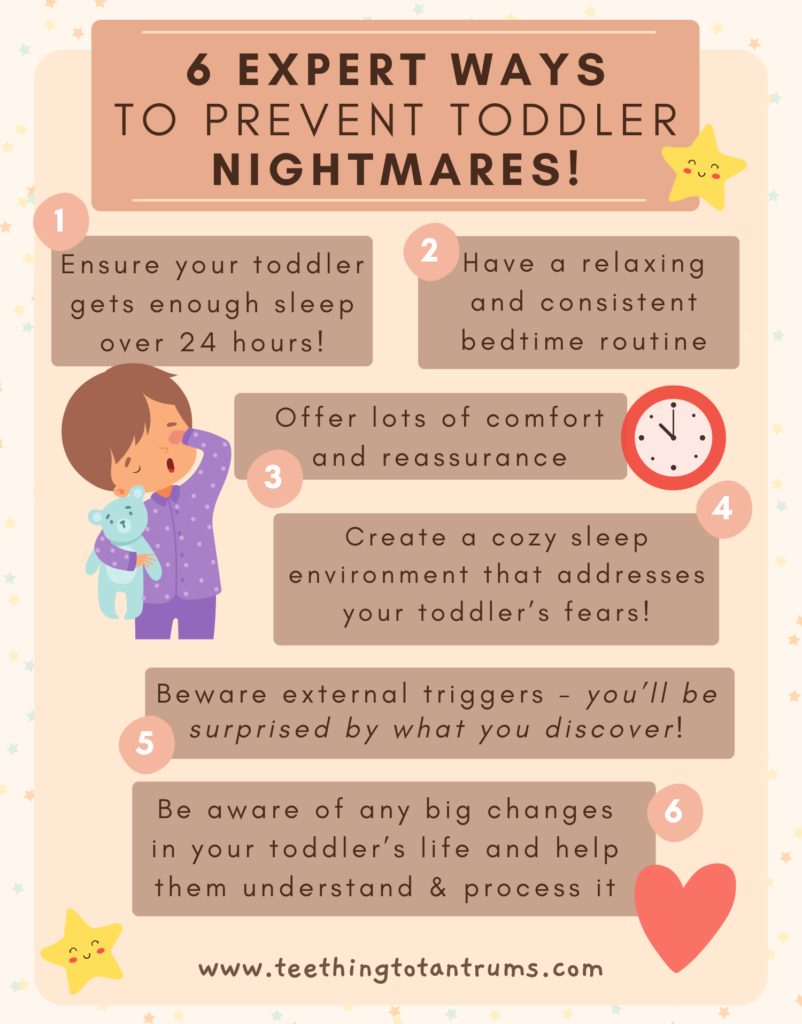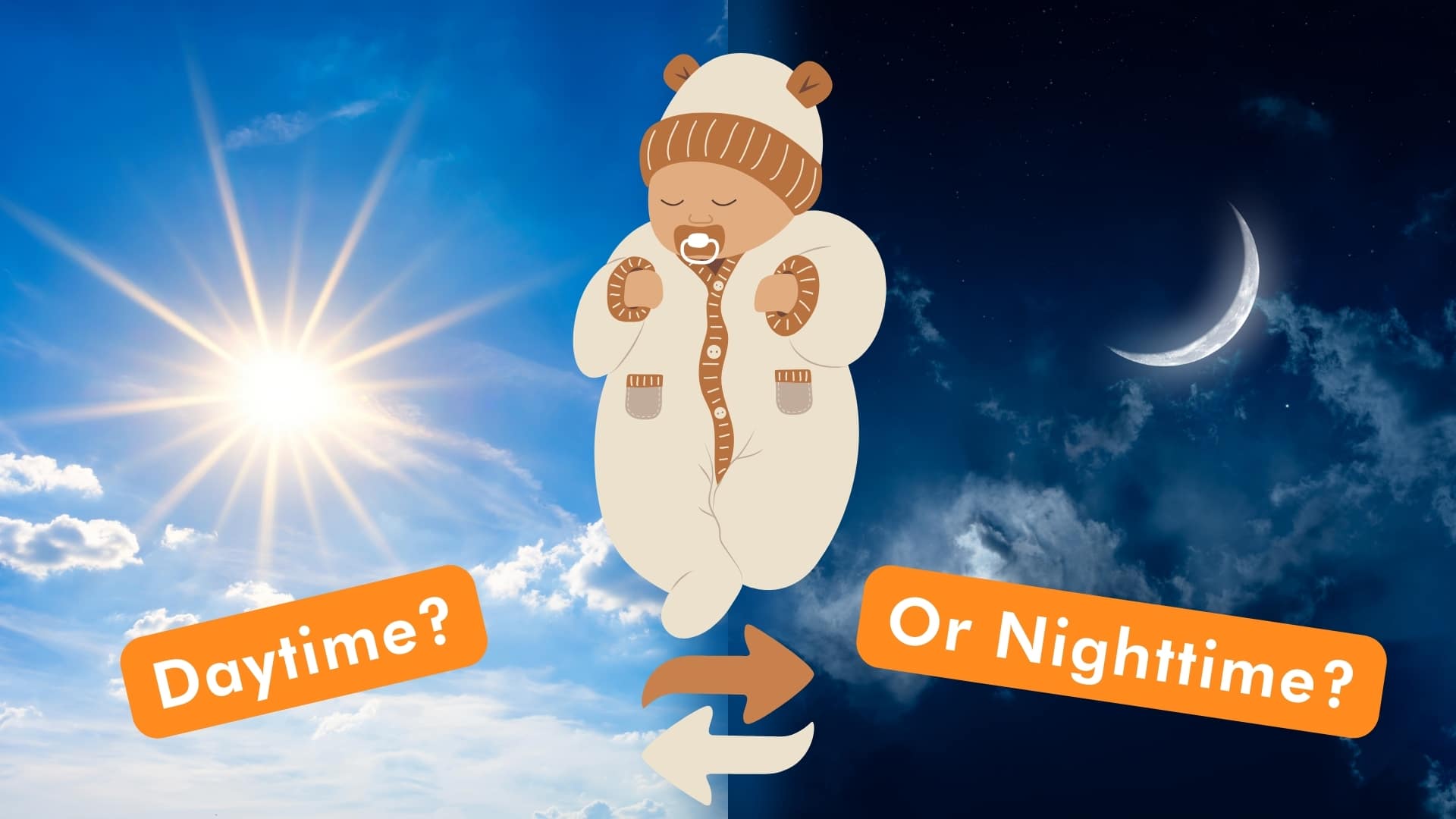Toddler nightmares are one of the most common night disturbances that younger children can experience along with night terrors and sleepwalking.
And as alarming as nightmares can be for your little one, they are completely normal.
However, to help you understand why nightmares happen and what you must do when they wake your toddler up at night, here are my top tips and tricks.

Table of Contents
Key Takeaways
- Overtiredness, stress, imagination, illness, scary experiences, and medical issues can trigger nightmares in toddlers. Preventing these triggers where possible can reduce bad dreams.
- Comforting a toddler after a nightmare involves hugging, reassuring, and providing positive distractions. Being patient and not dismissing their fear is important.
- Preventing toddler nightmares involves ensuring good sleep habits to avoid overtiredness, having a comforting bedtime routine, addressing fears openly, and creating a cozy sleep environment.
Why Do Nightmares Happen?
For toddlers, nightmares are linked to their developing vivid imaginations combined with what they have seen, heard, interacted with, and learned about recently. Nightmares can also be influenced by stress or overtiredness as well as big changes in their daily routine.
Causes Of Nightmares In Toddlers
There are several reasons your toddler might be experiencing nightmares. By being careful and working to avoid triggers, you can create a situation where your toddler is less likely to suffer from nightmares. The most common nightmare triggers include:
- Tiredness: Being overtired is a common factor contributing to nightmares in toddlers. When your child doesn’t get enough sleep, it can lead to restless sleep and vivid dreams, sometimes frightening.
- Stress and anxiety: Toddlers have busy lives, encountering various situations daily. Stressful events, such as scary experiences, starting daycare or moving house can cause anxiety at bedtime that may lead to nightmares during sleep.
- Imagination: A toddler’s imagination is developing at a rapid rate which is perfectly normal. However, their active imagination can often manifest itself through intense dreams, both pleasant and scary.
- Being unwell: An illness that results in a high fever can disrupt a child’s sleep pattern, making them more prone to nightmares. A high fever can also cause hallucinations (both when awake and asleep).
- Witnessing scary scenes: Watching scary movies or listening to spooky stories can induce nightmares in your child. You must make sure your toddler is not being exposed to frightening images and stories that they are not yet mature enough to process.
- Medical conditions or medication: In some cases, nightmares can be triggered by underlying medical issues, or as a side effect of certain medicines. Consult with your pediatrician if you suspect a medical condition or medicine is causing your toddler’s nightmares.
TOP TIP: Never underestimate what your toddler can take in even if you think they are not watching. I remember watching the movie “Twister” when I thought my 3-year-old son was playing with his toys in the room. Unfortunately, despite not watching it directly, he was badly affected by the experience which resulted in nightmares, and being very scared when it was windy.

How To Help A Toddler Go Back To Sleep After A Nightmare
Nightmares are very scary for adults… so you can only imagine what they feel like for toddlers.
Therefore, if your toddler is waking from a nightmare they will most definitely need a bit of TLC to help them go back to sleep.
Here are my top tips to help your little one relax after having a nightmare:
- Hug and cuddle: There is no better remedy than physical comfort like a warm embrace from you. This will provide an instant sense of security and reassurance that they’re safe after a scary dream.
- Verbal communication and reassurance: Encourage your toddler to talk about their nightmare by asking open-ended questions. This opens up a line of communication, allowing the child to process the emotions and feel listened to. Assure them that nightmares are normal, and they’re safe in their bed. Speak in a calm and soothing voice to help them feel relaxed.
- Relaxed environment: Ensure the child’s bedroom is a calm and quiet space. Make any necessary adjustments, such as dimming the lights, or turning the white noise machine or audio story back on, to create a peaceful atmosphere. If you need to, you can create a monster spray (water, sequins and some essential oil in a spray bottle) to keep scary beasts at bay too.
- Positive distractions: Redirect your toddler’s focus from the nightmare by engaging them in a soft activity such as reading their favorite book, listening to an audio story, or singing a lullaby. This can help create positive emotions and facilitate a smooth transition into sleep.
Patience, understanding, and empathy are essential when helping your toddler cope with nightmares. Never dismiss the nightmare as nothing!
Looking to get your little one to sleep quickly and effortlessly? Check out my Bedtime and Nap Cheat Sheet and master the art of making daytime naps and bedtimes as seamless as possible.
A bedtime & nap cheat sheet so good your little one will ask you to put them to bed...
Laura Williams "This is a life saver! I'm so glad I downloaded your bedtime & nap cheat sheet. My little one actually asked me to put him to bed last night! Unbelievable! Thank you so much!"
Click Here For The FREE Cheat Sheet
How To Prevent Toddler Nightmares
Nightmares are not fun for toddlers. They’re also not fun for you.
If nightmares are troubling your toddler’s sleep, helping them feel safe and secure will go a long way to helping limit the number of nightmares that occur. Here are the most effective techniques that I’ve found can help prevent nightmares:

1. Prevent Overtiredness
Overtiredness will increase the likelihood of nightmares in toddlers. When your child is sleep-deprived, their brain will struggle to process emotions and experiences, potentially leading to bad dreams.
As I am always stressing, having a consistent sleep schedule and ensuring your child gets enough sleep in 24 hours is important for preventing overtiredness.
That means that for children aged 1-3 years, 11 to 14 hours of sleep (including naps) is what you should be aiming for per day.
Here are some tips to help prevent overtiredness in your toddler:
- Set an age-appropriate bedtime: Allow around 5-6 hours of awake time between your child’s nap and bedtime.
- Establish a bedtime routine: A soothing bedtime routine will most definitely help signal to your child that it’s time to sleep and help them settle more quickly.
- Avoid stimulating activities before bed: Engaging in calming activities, such as reading a book or taking a warm bath, can help your child relax and prepare for bedtime. Avoid screens in the lead-up to bedtime too.
- Ensure a comfortable sleep environment: Keep your child’s bedroom cozy, dark or dimly lit, and at the correct temperature to promote restful sleep. Use a white noise machine or audio app to help your little one to settle peacefully.
By taking these steps to prevent overtiredness, you can help reduce the likelihood of nighttime disturbances like nightmares and create a peaceful sleep experience for your toddler.
2. Create A Comforting Bedtime Routine
In my experience, when a child follows a regular sleep schedule, they’re less likely to experience sleep disturbances… And fewer sleep disturbances = fewer nightmares.
- Wind down the energy levels in preparation for the bedtime routine. Play calming games with your toddler.
- Bath time. Have special bath toys to keep things interesting but try to avoid the energy levels increasing. Bubbles and waterfall toys are great.
- Getting dressed for bed. Offer two simple choices to help your toddler feel included in the process. “Would you like to wear your red PJs or your blue ones?”
- Offer a glass of water or a bedtime snack depending on your child’s age.
- Clean teeth and final toilet visit depending on age.
- Read a book. If your toddler experiences nightmares a lot, choose books that address fears and help your little one feel safe. You can also read what I call ‘cozy, feel-good books’, that simply help your toddler feel relaxed and calm.
- Alleviate fears. If your child is scared of the dark, turn on a night light. If they’re scared of monsters, do a final wardrobe check and spray your monster spray.
- Final cuddle, lullaby, and goodnight kiss in crib or bed whilst still awake.
- Lights out by 8pm at the latest.
3. Offer Reassurance and Comfort
When your toddler wakes up from a nightmare, it’s crucial to acknowledge their fear calmly while offering hugs and gentle rubs. This helps your child feel safe and secure.
It is also important to encourage your toddler to share any fears they might have. Listen attentively to their concerns, validating their emotions. Doing so helps strengthen your bond and provides a safe environment for your child to express their feelings.
What is it? This book contains 8 different plush toys each displaying a different emotion - Anger, Anxiety, Peaceful, Sadness, Happiness, Love, Confidence and Tangled (Scribble) - to help children identify and process their emotions.
Why do I like it? This is a very helpful tool to teach children about emotions and how to handle them. Its fun plush toys make learning about emotions manageable and approachable. The Little SPOT of Emotion book is also ideal for children with social-emotional needs.
Never dismiss their fears or minimize their experiences, as this may invalidate their emotions and make them less likely to talk to you about them.
If your little one is showing signs of a particular fear or anxiety using books as a way to promote discussion about their worries is really effective.
Here are some of my favorites for promoting healthy conversations about issues that may be causing sleep disturbances for your little one.
- Franklin in the Dark By Paulette Bourgeois (fear of the dark)
- You’re the Biggest By Lucy Tapper and Steve Wilson (the arrival of a sibling)
- Bye Bye Time By Elizabeth Verdick (separation anxiety)
- The Berenstain Bears’ Moving Day By Stan Berenstain (moving house)
- The Owl Who Was Afraid Of The Dark By Jill Tomlinson (fear of the dark)
- How to Catch a Monster By Adam Wallace (scared of monsters)
- The Boy with Big, Big Feelings By Britney Winn Lee (handling big emotions and separation anxiety)
TOP TIP: You could also consider techniques such as deep breathing or positive visualization to promote relaxation before bedtime. Teddy bear breathing is a great way for toddlers to calm down and focus.
4. Create A Sleeping Environment Which Addresses Common Toddler Fears
A cozy sleep environment helps soothe your toddler and makes it easier for them to relax before bedtime. Subsequently, they’re less likely to experience toddler nightmares.
A comfortable sleep environment should include a clean, cozy, and organized room at a pleasant temperature, with soft, comfortable bedding.
Using a nightlight or a soft glowing lamp will help alleviate your toddler’s fear of the dark and allow them to see their surroundings, providing a sense of security and reducing anxiety that could trigger nightmares.
Finding the right night light for your child can be quite a task. You want something safe, comforting, and practical. The Cozy Starry Night Light ticks these boxes, with eye-friendly warm lighting and an easy-to-use dimmer.
Its gentle glow makes it the best night light for feeding baby, diaper changes, or comforting your little one back to sleep.
As your baby grows the Cozy Starry Night Light's starry sky projection can provide comfort and gentle quiet time stimulation. Its soft lighting ensures a dreamy, peaceful environment, supporting your baby’s natural sleep cycle.
It really is a fantastic nightlight (at a very reasonable price!)
- Eye-friendly warm lighting with adjustable brightness.
- Includes a timer function for convenience.
- Projects a starry sky that is soothing for little ones.
- Rechargeable battery, so it's very portable.
- A USB adapter is not included for charging.
- The star projector is static without motion (however, this is ideal for very young babies and toddlers).
- Battery life varies based on the brightness settings.
Use a white noise machine and or audio music/story apps to help calm your little one and keep them entertained.
White noise machines are a game-changer for your little one's sleep and having one that plays all night is a must. With a long-lasting battery, this compact and stylish white noise machine contains 21 non-stop relaxing noises, which will lull your little one to sleep night after night, no matter where you are!
While eliminating the fear of the dark or imaginary monsters may not eliminate all nightmares, it can certainly reduce their frequency and intensity.
TOP TIP: To create a monster spray, have a craft session with a spray bottle, water, sequins, lavender or camomile essential oil, and stickers. Let your toddler decorate the bottle as they wish and use it every night as a monster deterrent.
5. Consider Environmental And Dietary Triggers
Monitoring your toddler’s daily activities and interactions can also assist in limiting any nightmare triggers. You’d be amazed by how much this influences your little one!
Foods that cause nightmares in toddlers:
- Caffeine. Found in certain beverages and food items, caffeine can trigger excessive stimulation that leads to bad dreams. Ensuring your toddler consumes a balanced, wholefood diet that avoids caffeine can aid in reducing nightmares.
- Sugar. Too much sugar in your toddler’s diet can also disrupt sleep, making it difficult for them to settle and sleep soundly… resulting in them becoming overtired. Keeping sugar levels down (both natural and processed) will help to reduce toddler nightmares for sure.
Environment triggers for toddler nightmares:
- Limit exposure to frightening images from movies, TV shows, or computer games.
- Avoid scary stories at bedtime especially.
- Talk about any big changes that are coming up in your toddler’s routine such as moving house, starting daycare, or returning to work.
6. Understand Emotional Stressors And Be Patient During The Change
Big changes in a toddler’s life can cause stress and anxiety, often leading to nightmares. This can include simple events, such as seeing a scary creature or having a fight with a friend or sibling.
Other significant life changes like moving house, the arrival of a sibling, or transitioning from preschool to kindergarten can also impact a child’s emotional state.
Understanding these stressors will be essential for providing support and helping your toddler manage their emotions (and preventing toddler nightmares):
- Spend more one-on-one time together during the day.
- Maintain a consistent sleep schedule and bedtime routine.
- Incorporate calming activities before bed, like reading a book or having a cuddle.
- Use books to help address any fears, stress, or anxiety your toddler may be experiencing.
Remember that being patient, understanding, validating fears, and offering lots of love will go a long way in helping your toddler feel secure and reduce the occurrence of nightmares.
Do All Children Suffer From Nightmares?
There is some division as to whether young children experience nightmares.
According to the Pediatric Sleep Council, “It’s unlikely that infants have nightmares”. But the American Academy of Pediatrics (AAP) says “Kids can start having them as young as 6 months old.”
In my experience, toddlers can experience nightmares… However, babies as young as 6 months rarely do.
Some of the division may be because nightmares are often confused with night terrors. Of which toddlers can certainly experience.
Whatever the experts say… you will know if your little one is experiencing a distressing sleep issue and the most important thing is that you can identify between night terrors and nightmares as they need to be handled differently.
Toddler Nightmares vs Night Terrors
Nightmares and night terrors are both common sleep disturbances in young children, but they differ in several ways. The table below summarizes the main differences between the two:
| Nightmares | Night Terrors | |
| Age Range | Nightmares are common between 3 and 6 years old. | Night terrors are common between 3 and 8 years old. |
| How Common? | 50% of children report frequent nightmares | 6% of children are reported to experience night terrors |
| In What Sleep Stage Do They Occur? | Light sleep (REM) | Deep sleep |
| Characteristics | Vivid, unpleasant dreams, feeling afraid, waking up crying | Thrashing, screaming, and agitation, but not fully awake |
| Time of Night | Nightmares are more common in the early hours of the morning. | Night terrors usually occur in the first few hours of sleep. |
| Awake & Communicative | Yes | No |
| Memory | Can remember | Unlikely to remember |
| Underlying Causes | Nightmares can happen for any reason, but commonly reflect developing imaginations, inner fears, anxiety, or frightening experiences, like watching a scary film. | Night terrors are not associated with emotional problems but can run in families. They can also be related to sleepwalking or overtiredness. |
Nightmares are vivid, distressing dreams that happen during light sleep, or REM sleep, and often occur in the early morning. When a child has a nightmare, they will wake up and remember the dream. They may want to discuss it with you and might have difficulty falling back asleep.
On the other hand, toddler night terrors are episodes of partial waking, occurring during deep sleep. They commonly happen in the first half of the night and are less frequent than nightmares. Children may thrash, scream, or sleepwalk during a night terror. Even though they seem frightened, they are not fully awake and can’t be comforted.
Additionally, children experiencing night terrors are usually unable to remember the episode, unlike nightmares which are often remembered by the child.
Although both can be distressing for children and adults, night terrors generally have less emotional impact on your toddler because they can’t recall the event.

When to Seek Professional Help For Toddler Nightmares
If your child’s nightmares are causing distress and extreme night stress and despite all your attempts, not improving, you should consult with a doctor, pediatrician, or sleep specialist.
Sleep disorders, such as sleep apnea or parasomnia, may need medical attention.
In some cases, recurring nightmares may indicate PTSD or stress factors affecting your child.
Ultimately, if you suspect your toddler is experiencing nightmares first identify what you think the cause may be and then follow the steps outlined in this article to help your toddler cope.
If that doesn’t work, then seek medical help.
Frequently Asked Questions About Toddler Nightmares
Looking for more information about nightmares in toddlers? Here are the most frequently asked questions, answered just for you.
Q: At what age is it normal for a child to start experiencing nightmares?
A: Nightmares usually occur at any age, but they’re more common in children between the ages of 3 and 6.
Q: Is my toddler having nightmares?
A: If your toddler wakes up crying, seems distressed, and can remember a scary dream, they may be experiencing nightmares.
Q: Why does my toddler wake up screaming at the same time every night?
A: Consistent awakening and screaming could indicate night terrors, which are different from nightmares. Read this post about night terrors to learn more.
Q: Are frequent nightmares a cause for concern in 4-year-olds?
A: Occasional nightmares are normal, but if they consistently disrupt sleep for your 4-year-old, it’s worth discussing with a pediatrician to address potential causes.
Q: When do toddler nightmares stop?
A: Nightmares may decrease as children grow older, but there’s no specific age when they stop. Helping your child develop coping strategies and reducing triggers can improve their sleep.
Q: Are nightmares warning signs?
A: Nightmares aren’t warning signs for superstitious activity, but if they become frequent and disruptive, it’s worth investigating with a healthcare professional to see if any underlying medical conditions are triggering the nightmares.
Need More Parenting Help?
- Download our FREE Bedtime & Nap Sleep Cheat Sheet. It’s a free, easy-to-use and proven formula designed for parents of 0-5 year olds to master the art of consistently undisturbed and restful sleep without the yelling, nagging or exhausting long-winded evenings.
- Check out our Parenting Toolbox. You’ll get access to expertly-chosen products that you can guarantee are the best for your little one and your wallet.
- Are you looking for personalized guidance to navigate the challenges of parenting? I offer 1-on-1 consultations to bring you tailored strategies and actionable advice to help support your child's growth and well-being with confidence.

A bedtime & nap cheat sheet so good your little one will ask you to put them to bed...
Laura Williams "This is a life saver! I'm so glad I downloaded your bedtime & nap cheat sheet. My little one actually asked me to put him to bed last night! Unbelievable! Thank you so much!"
Click Here For The FREE Cheat Sheet





